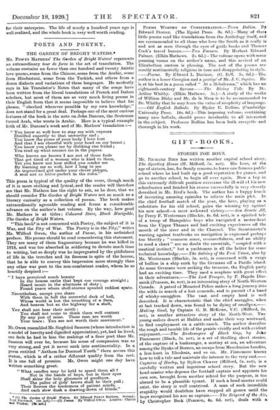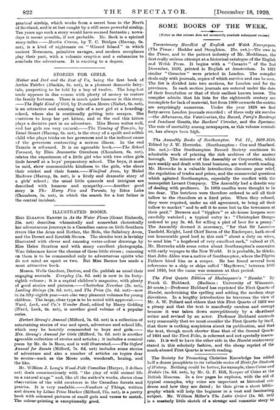GIFT-BOOKS.
STORIES FOR BOYS.
Mr. RICHARD BIRD has written another capital school story, The Sporting House (H. Milford, Ss. net). His hero, at the age of sixteen, has, for family reasons, to leave one famous public school where lie had built up a good reputation for games, and go to another school, to begin all over again. How a boy in this extremely difficult position overcame the ill-will of his new schoolmates and finished his course successfully is very cleverly described in Mr. Bird's book. The author has a happy knack of inventing amusing episodes to relieve the main plot. In the chief football match of the year, the hero, playing aa a substitute for his old school, gains the winning try against his new school—a most awkward victory.—Sca Scouts All, by Percy F. Westerman (Biocide, 4s. t3d, net), is a spirited talc of a troop of Hampshire boys who navigated a motor-boat from the Upper Thames and had exciting experiences off the mouth of the river and in the Channel. The Scoutmaster's warning against textbooks on navigation is expressed perhaps too bluntly ; "common sense, resourcefulness, and an ability to read a chart" are no doubt the essentials, "coupled with a nautical instinct," but a yachtsman is all the better for sonic technical knowledge.--The Baldry of the Fuel Tama, also by Mr. Westerman (Mackie, fie. net), is concerned with a cargo of bullion in a ship sunk by the Germans off a Pacific island. As some Germans were seeking the treasure, the English party had an exciting time. They used a seaplane with great effect in their adventures—The Lost Trooper, by F. Haydn Dim- mock (Pearson, 4s. net), is an interesting story of North-Western Canada. A patrol of Mounted Police makes a long journey into the wilds in search of a lost comrade, and in pursuit cf a band of whisky-smugglers. The vast and empty land is well described. It is characteristic that the chief smuggler, when at last tracked down, was found to be dying of smallpox.— Making Good, by Captain Cl. B. McKean, V.C. (Milford, 58. net), is another attractive story of the North-West. Twc young sailors desert at Halifax and make their way westward, to find employment on a cattle-ranch. The author describes the rough and tumble life of the prairie vividly and with evident enjoyment. The Bushrangers of Black Gap, by Jokn Finnemore (Black, Ss. net), is a net of thrilling short stories, of the capture of a bushranger, a mutiny at sea, an adventure among the Dyake of Borneo, an escape from Manchurian bandits, a lion-hunt in Rhodesia, and so on. Mr. Finnemoro knows how to toll a tale and maintain the interest to the very end.— Captains of Harley, by Hylton Cleaver (Milford, Is. net), is a carefully written and ingenious school story. But the new head-master who deposes the football captain and appoints his own son, brought from another school for the purpose, is too absurd to be a plausible tyrant. If such a head-master could exist, the story is well contrived. A man of such incredible stupidity would doubtless have stopped all games until the boys recognized his son as captain.—The Brigand of the Air, by Christopher Beck (Pearson, 4s. 6d. net), deals with a piratioal airship, which works from a secret base in the North of Scotland, and is at last caught by a still more powerful airship. Ten years ago such a story would have seemed fantastic ; nowa- days it seems possible, if not probable. Mr. Beck is a spirited story-teller.—Martin Crusoe, by T. C. Bridges (Harrap, 6s. net), is a kind of nightmare on "Wizard Island" in which ancient Norsemen, primitive savages, and modern aeroplanes play their part, with a volcanic eruption and a submarine to oonclude the adventures. It is exciting to a degree.







































 Previous page
Previous page